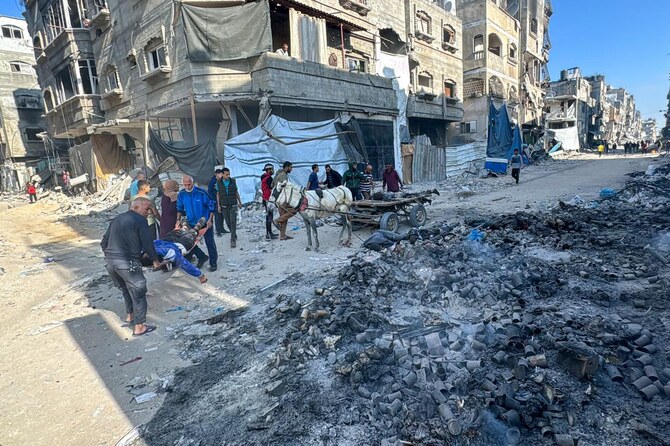CAIRO: Israeli military strikes killed at least 22 Palestinians across the Gaza Strip on Wednesday, as Israeli forces deepened their incursion into Beit Hanoun town in the north, forcing most remaining residents to leave.
Residents said Israeli forces besieged shelters housing displaced families and the remaining population, which some estimated at a few thousand, ordering them to head south through a checkpoint separating two towns and a refugee camp in the north from Gaza City.
Men were held for questioning, while women and children were allowed to continue toward Gaza City, residents and Palestinian medics said.
Israel’s campaign in the north of Gaza, and the evacuation of tens of thousands of Palestinians from the area, has fueled claims from Palestinians that it is clearing the area for use as a buffer zone and potentially for a return of Jewish settlers.
“The scenes of the 1948 catastrophe are being repeated. Israel is repeating its massacres, displacement and destruction,” said Saed, 48, a resident of Beit Lahiya, who arrived in Gaza City on Wednesday.
“North Gaza is being turned into a large buffer zone, Israel is carrying out ethnic cleansing under the sight and hearing of the impotent world,” he told Reuters via a chat app.
Saed was referring to the 1948 Middle East Arab-Israeli war which gave birth to the state of Israel and saw the displacement of hundreds of thousands of Palestinians from their home towns and villages in what is now Israel.
NO PLANS FOR SETTLERS’ RETURN
The Israeli military has denied any such intention, and Prime Minister Benjamin Netanyahu has said he does not want to reverse the 2005 withdrawal of settlers from Gaza. Hard-liners in his government have talked openly about going back.
It said forces have killed hundreds of Hamas militants in Jabalia, Beit Lahiya and Beit Hanoun during its new military offensive, which began more than a month ago. Hamas and the Islamic Jihad armed wing claimed killing several Israeli soldiers during ambushes and anti-tank rocket fire.
Efforts by Arab mediators, Qatar and Egypt, backed by the United States, have so far failed to end the war in Gaza, with Hamas and Israel trading the blame for the lack of progress.
Speaking on Wednesday, US Secretary of State Antony Blinken said Israel “has accomplished the goals that it set for itself” by taking out Hamas’ leadership and ensuring the group is unable to launch another massive attack. “This should be a time to end the war,” he said.
“We also need to make sure we have a plan for what follows,” he said, “so that if Israel decides to end the war and we find a way to get the hostages out, we also have a clear plan so that Israel can get out of Gaza and we make sure that Hamas is not going back in.”
Senior Hamas official Sami Abu Zuhri said Blinken’s comments showed: “We are facing one enemy and that the US enmity against the Palestinian people is no less than that of the occupation.”
On Tuesday, the United States stressed at the United Nations that “there must be no forcible displacement, nor policy of starvation in Gaza” by Israel, warning such policies would have grave implications under US and international law.
Medics said five people were killed in an Israeli strike that hit a group of people outside Kamal Adwan Hospital near Beit Lahiya, while five others were killed in two separate strikes in Nuseirat in central Gaza Strip where the army began a limited raid two days ago.
In Rafah, near the border with Egypt, one man was killed and several others were wounded in an Israeli airstrike, while three Palestinians were killed in two separate Israeli airstrikes in Shejaia suburb of Gaza City, medics added.
Later on Wednesday, an Israeli strike on a house in western Khan Younis in the southern Gaza Strip killed eight people, medics said.
Hamas-led gunmen attacked Israel last October, killing 1,200 people and taking more than 250 hostages, according to Israeli tallies.
More than 43,500 Palestinians have been killed in Gaza over the past year, Palestinian health officials say, and Gaza has been reduced to a wasteland of wrecked buildings and piles of rubble, where more than 2 million Gazans are seeking shelter in makeshift tents and facing shortages of food and medicines.




















